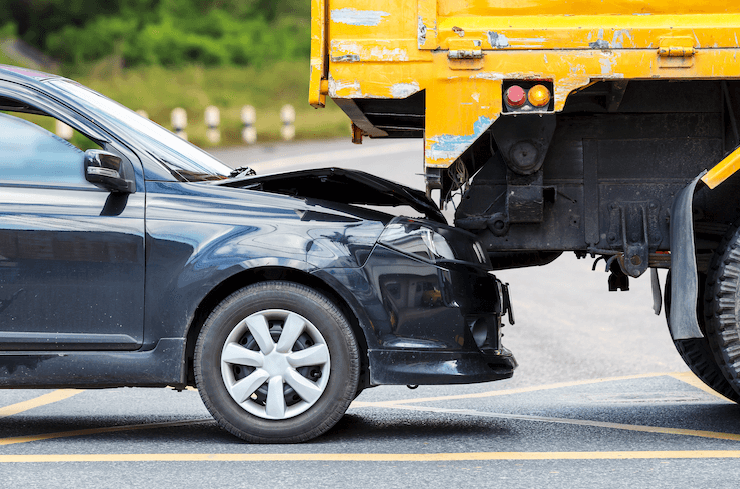You don’t have to necessarily pay for your medical expenses after a truck accident. If you have Personal Injury Protection (PIP) or Medical Payments Coverage (MedPay), your insurance can cover these costs. The liability insurance of the at-fault driver might also pay for your medical bills. Uninsured and underinsured coverage protects you if the other driver lacks sufficient insurance.
Understanding your state laws and filing claims promptly is crucial. Consulting a knowledgeable lawyer can maximize your compensation and clarify your options. To learn more about how to protect yourself and cover your expenses after an auto wreck, continue exploring this topic.
Determining Fault
Determining fault in a truck accident is important because it directly impacts who’ll be responsible for covering the medical expenses. When you’re involved in a truck accident, figuring out who’s liable isn’t just a formality—it’s a necessity. Determining liability will dictate which insurance coverage kicks in to pay for your medical bills.
You need to gather all the evidence you can, including police reports, witness statements, and any available video footage. This information helps paint a clear picture of what happened and who’s at fault.
You can’t afford to guess when it comes to liability. Missteps here can lead to significant financial burdens. Insurance companies will scrutinize every detail, and they’re not always on your side. They may try to minimize their payouts by shifting the blame. Hence, having concrete evidence is vital.
If the truck driver is found at fault, their insurance coverage should handle your medical expenses, alleviating your financial stress. Keep in mind, multiple parties can be liable in truck accidents, including the trucking company or even the manufacturer.
Understanding and proving fault is a critical step in ensuring the right party’s insurance covers your medical costs.
Types of Insurance Coverage
When you’re dealing with medical expenses after a truck accident, understanding your insurance options is important. You’ll need to know about Personal Injury Protection, Medical Payments Coverage, and how to file Liability Insurance Claims.
These coverages can greatly affect how your medical bills are handled and what costs you’ll need to pay out-of-pocket.
Personal Injury Protection
Personal Injury Protection (PIP) coverage guarantees you receive immediate medical care after a truck accident, regardless of who was at fault. PIP is designed to cover your medical expenses swiftly, making sure you don’t face financial strain during recovery.
It’s essential to comprehend the coverage options available under your PIP policy. Typically, PIP covers medical bills, hospital expenses, and even rehabilitation costs. However, specifics can vary, so reviewing your policy details is vital.
The reimbursement process under PIP is straightforward. Once you’ve received medical treatment, your insurance provider will handle payments directly, sparing you the hassle of out-of-pocket expenses. Keep all medical records and receipts, as they’ll speed up claim processing and guarantee you’re reimbursed accurately for all covered costs.
Your PIP policy requirements will outline what’s necessary to qualify for benefits. These usually include timely reporting of the accident and submitting required documentation promptly. Coverage limits are another crucial aspect to take into account, as they dictate the maximum amount your insurance will pay. If your medical expenses exceed these limits, you might need additional coverage or alternative solutions.
Understanding your policy’s requirements and limits will help you navigate the aftermath of a truck accident more efficiently.
Medical Payments Coverage
Medical Payments Coverage (MedPay) ensures that your medical bills are covered promptly, regardless of who’s at fault in a truck accident. This type of insurance can be a financial lifesaver, offering peace of mind by providing immediate payment for necessary medical treatments.
MedPay is designed to cover various medical expenses, such as hospital visits, surgeries, X-rays, and even ambulance fees.
When considering your coverage options, MedPay stands out because it simplifies the payment process. You don’t have to wait for a lengthy investigation to determine fault before receiving funds. This swift access to payment options allows you to focus on recovery rather than worrying about mounting medical bills.
MedPay often complements other insurance types, providing an additional layer of financial protection.
Another advantage of MedPay is its flexibility. It covers you, your passengers, and even family members residing in your household if they’re involved in an accident. This broad scope of coverage guarantees that multiple parties benefit from the policy.
Liability Insurance Claims
Liability insurance claims play a pivotal role in determining who bears the financial responsibility for damages after a truck accident. When you’re involved in such an incident, understanding the different types of insurance coverage can greatly impact how much you pay out-of-pocket. Liability insurance, held by the at-fault party, is designed to cover the costs of your medical expenses, property damage, and other losses.
Navigating insurance negotiation can be complex, so it’s vital to gather all necessary documentation and evidence to support your claim. This includes medical bills, repair estimates, and accident reports. Presenting a well-documented claim can increase your chances of a favorable outcome.
Claim reimbursement is another crucial aspect. Once liability is established, the insurance company of the at-fault party will reimburse you for your medical expenses and other damages. However, keep in mind that insurance companies often aim to minimize payouts.
Being knowledgeable about your rights and the specifics of liability coverage can help you negotiate better terms.
Personal Injury Protection
You need to grasp how Personal Injury Protection (PIP) can cover your medical expenses after a truck accident. PIP is a type of auto insurance that helps pay for your medical bills regardless of who’s at fault. It’s important to know your coverage options because they can greatly impact how much financial strain you’ll face. Typically, PIP covers medical expenses, lost wages, and even rehabilitation costs. Some policies may also cover additional services like childcare or household chores if you’re unable to perform them due to your injuries.
Legal requirements for PIP vary depending on the state you live in. In some states, having PIP is mandatory, while in others, it’s optional. You should review your state’s specific regulations to make sure you’re adequately covered. If you live in a no-fault state, you’re often required to carry PIP, making it easier to get your medical expenses paid quickly.
Understanding your PIP coverage is important for your financial well-being after an accident. It provides a safety net, making sure that you don’t have to worry about medical expenses piling up when you’re trying to recover.
Liability Insurance
While PIP offers immediate relief for your medical expenses, understanding how liability insurance works is equally important for long-term financial protection after a truck accident. Liability insurance is designed to cover the costs incurred by the other party if you’re found at fault. This includes their medical expenses, property damage, and sometimes even lost wages.
Insurance requirements vary by state, but all states mandate some form of liability insurance for drivers. It’s vital to make sure you meet these requirements to avoid legal complications.
Coverage options for liability insurance generally fall into two categories: bodily injury liability and property damage liability. Bodily injury liability covers medical expenses and other costs for the injured party, while property damage liability covers repairs or replacement of damaged property.
Having adequate liability insurance isn’t just a legal obligation; it’s a wise financial decision. Without sufficient coverage, you could be personally responsible for paying substantial sums out of pocket. Review your policy regularly and consider higher coverage limits to better protect yourself.
Uninsured and Underinsured Coverage
Uninsured and underinsured motorist coverage offers vital financial protection when the at-fault driver lacks sufficient insurance to cover your medical expenses and other damages. This type of coverage steps in to fill the gap, ensuring you’re not left bearing the full financial responsibility for an accident you didn’t cause. This coverage can be a lifesaver, especially in situations where the at-fault driver’s insurance is minimal or nonexistent.
It’s important to understand your legal options if you’re involved in a truck accident with an uninsured or underinsured driver. Without adequate coverage, you could face significant out-of-pocket expenses. By having uninsured and underinsured motorist coverage, you can mitigate these costs and alleviate the stress associated with medical bills and vehicle repairs.
In some states, this coverage is mandatory, while in others, it’s optional but highly recommended. Don’t wait until it’s too late to discover you lack this essential protection. Review your insurance policy and consider adding or increasing your uninsured and underinsured motorist coverage. This proactive step can safeguard your financial future and provide peace of mind, knowing you’re prepared for any eventuality on the road.
Medical Payment Coverage
Medical payment coverage, often known as MedPay, can be an important safety net after a truck accident. It helps cover your medical expenses, regardless of who’s at fault, but understanding its scope and limits is vital.
Knowing how to file a claim efficiently guarantees you maximize this benefit when you need it the most.
Coverage Scope Limits
Your medical payment coverage often has specific limits that define the extent of expenses it will cover after a truck accident. It’s essential to understand these limits so you’re not caught off guard by unexpected costs.
Coverage options vary widely between policies, so review yours carefully. Some plans may cover a broad range of medical expenses, from emergency room visits to ongoing physical therapy, while others might be more restrictive.
However, be aware of policy exclusions. Insurers often exclude certain treatments or types of care from coverage. For instance, experimental treatments or procedures deemed unnecessary by your insurer mightn’t be covered. Always read the fine print to know what’s included and what’s not.
Knowing the scope of your coverage can help you make informed decisions about your medical care. If your coverage has low limits, you might need to explore other avenues to pay for your medical expenses. Don’t wait until bills start piling up to find out what’s covered.
Being proactive about understanding your medical payment coverage and its limits can save you a lot of stress and financial strain after a truck accident.
Filing a Claim
Understanding your coverage limits is just the first step; the next crucial action is filing a medical payment claim promptly and accurately. You need to start by gathering all relevant documents, such as medical bills, accident reports, and insurance policies. Contact your insurance company and inform them about the accident and your intention to file a claim. This kicks off the claim process and confirms you’re on their radar.
Be meticulous in filling out the claim forms. Any mistakes could delay your benefits. Don’t hesitate to ask questions if you’re unsure about any part of the form. Your insurance options might include MedPay (Medical Payment Coverage) or Personal Injury Protection (PIP). Both can cover your medical expenses irrespective of who’s at fault.
Submit your claim as soon as possible, ideally within 24-48 hours after the accident. Quick action can help speed up the approval process, reducing the financial burden on you. Keep copies of everything you submit and follow up regularly to track the progress of your claim.
State Laws and Regulations
Finding your way through state laws and regulations is crucial to understanding your rights and responsibilities when it comes to paying for medical expenses after a truck accident. Each state has its own set of statutes and insurance requirements that dictate how medical expenses should be handled. Knowing these laws can make a significant difference in how you manage your financial responsibilities after an accident.
State statutes often outline the minimum insurance coverage required for vehicles, including trucks. This insurance is intended to cover various expenses, including medical bills, in the event of an accident. Some states operate under no-fault insurance laws, meaning your own insurance policy will cover your medical expenses up to a certain limit, regardless of who’s at fault. Other states follow tort-based systems, where the at-fault party’s insurance is responsible for covering the damages.
Understanding these regulations can help you navigate the complexities of dealing with insurance companies and make sure you’re not left paying out-of-pocket for expenses that should be covered.
Always consult your state’s specific statutes and insurance requirements to get a clear picture of your obligations and rights after a truck accident.
Filing a Claim
Understanding state laws and regulations is the first step; now, let’s focus on the important process of filing a claim for your medical expenses after a truck accident.
First, gather all necessary documentation. This includes medical records, accident reports, and any correspondence with insurance companies. Accurate and thorough documentation is vital for a smooth claim process.
Next, notify your insurance company as soon as possible. Most policies have specific insurance requirements that mandate timely reporting of accidents. Provide them with all the collected documentation and follow their guidelines for filing a claim. Remember, your insurance company is your advocate, but they also have procedures to follow.
After notifying your insurer, contact the at-fault party’s insurance company. You’ll need to submit a claim to them as well, detailing your medical expenses and any other related costs. Be prepared for them to scrutinize your documentation, so accuracy is key.
Stay persistent and follow up regularly. Insurance companies often have many claims to process, and staying on top of your claim ensures it doesn’t get lost in the shuffle. By proactively managing your claim process and adhering to insurance requirements, you can successfully navigate the financial aftermath of a truck accident.
Seeking Legal Assistance
Seeking legal assistance is essential after a truck accident to guarantee you get the compensation you deserve.
You’ll need to find a competent lawyer who can guide you through understanding legal fees and the case evaluation process.
Don’t hesitate to reach out for professional help to navigate these complexities efficiently.
Finding a Competent Lawyer
A skilled lawyer can be your greatest ally when maneuvering through the complexities of medical expenses after a truck accident. Choosing the right attorney for you is vital, as they can help you navigate insurance claims, negotiate with medical providers, and secure the compensation you deserve.
A legal consultation benefits you by offering a clear understanding of your case’s strengths and weaknesses, along with a strategic plan moving forward.
When selecting an attorney, consider their experience with truck accident cases, their track record of success, and their familiarity with local laws. An experienced lawyer will know how to gather evidence, interview witnesses, and build a strong case on your behalf. They can also anticipate potential challenges and proactively address them, ensuring you have the best possible representation.
Don’t underestimate the importance of communication. You need an attorney who’s responsive, transparent, and willing to explain complex legal concepts in understandable terms.
Understanding Legal Fees
After finding a competent lawyer, it’s important to grasp how legal fees work to guarantee you make informed decisions about your representation. Legal representation often hinges on understanding the financial commitments involved.
Many personal injury lawyers operate on a contingency fee basis, meaning they only get paid if you win your case or secure a settlement. This payment model relieves some immediate financial pressure, allowing you to focus on your recovery.
However, not all costs are covered by contingency fees. Be clear about what expenses might come out-of-pocket, such as court fees, expert witness charges, and administrative costs. Discuss payment options thoroughly with your attorney to avoid surprises later.
Settlement negotiation is another critical aspect where having skilled legal representation can make a significant difference. Experienced attorneys are adept at maximizing your compensation, ensuring you’re not left shouldering medical expenses alone.
If financial assistance is a concern, some law firms offer flexible payment options or can connect you with third-party funding sources to cover upfront costs. Understanding these aspects of legal fees helps you manage your financial situation more effectively, ensuring you can afford the best possible legal support.
Case Evaluation Process
When you decide to pursue legal action after a truck accident, understanding the case assessment process is essential for building a strong foundation for your claim.
First, you’ll need to consult with an experienced attorney who specializes in truck accidents. During this initial consultation, your lawyer will assess the details of your case, including the extent of your injuries, the evidence available, and the potential for financial compensation.
Your legal options will be thoroughly reviewed, ensuring that you understand the differences between settlement negotiation and the lawsuit process.
If a settlement negotiation is possible, your attorney will aim to secure a fair amount that covers your medical expenses, lost wages, and other damages. However, if a settlement can’t be reached, your attorney will guide you through the lawsuit process, preparing you for what to expect in court.
Proper case assessment is vital because it helps identify the strengths and weaknesses of your claim, ultimately influencing your legal strategy. By seeking legal assistance, you maximize your chances of receiving the financial compensation you deserve.
Steps to Take After the Accident
Immediately following a truck accident, prioritize seeking medical attention to safeguard your well-being and document any injuries for future claims. Addressing your health is paramount, and obtaining professional care guarantees that your hospital bills are documented and can be used as evidence in your case.
After receiving medical attention, gather all related medical records and receipts to have a thorough understanding of your expenses.
Next, contact law enforcement and file a detailed accident report. This report will be crucial in establishing the facts and determining liability. Take photographs of the accident scene, vehicle damages, and any visible injuries. These visual records will support your claim and help your attorney build a strong case.
Inform your insurance company about the accident, but avoid giving detailed statements until you’ve consulted with a legal professional. Insurance adjusters may try to minimize your compensation, so having an attorney will guarantee your rights are protected.
Lastly, explore options for financial assistance to cover immediate expenses. This might include personal injury protection (PIP) coverage, health insurance, or even emergency funds. An experienced attorney can guide you through these options and help you secure the necessary resources during this challenging time.
Frequently Asked Questions
What Should I Do if My Injuries Worsen After the Initial Treatment?
If your injuries worsen after initial treatment, seek continued care immediately. Don’t hesitate to explore legal options for compensation. Addressing long-term effects early can secure financial assistance and guarantee you get the necessary medical attention.
How Can I Get Compensation if the Truck Driver Flees the Scene?
If the truck driver flees the scene, you’ve got legal recourse. Seek hit and run compensation through your insurance options and get legal assistance. An attorney can guide you on maximizing your compensation and handling complexities.
Can I Still Claim Expenses if I Don’t Have Health Insurance?
Yes, you can still claim expenses without health insurance. Explore your legal options to pursue compensation from the at-fault party. Additionally, look into financial assistance programs that can help cover your medical costs.
Are There Time Limits for Seeking Medical Reimbursement After a Truck Accident?
Yes, there are legal deadlines for seeking medical reimbursement. You must meet documentation requirements. Don’t let financial constraints stop you; insurance coverage may help. Act promptly to make sure you don’t miss out on compensation.
What if the Trucking Company Disputes My Injury Claims?
If the trucking company disputes your injury claims, you should secure legal representation. Strong medical evidence and witness testimony will be important during settlement negotiations to make sure you’re fairly compensated. Don’t underestimate the power of professional legal assistance.
Conclusion
To sum up, you don’t necessarily have to shoulder the burden of medical expenses after a truck accident. Determining fault, understanding your insurance coverage, and knowing state laws are essential steps.
File a claim promptly, and don’t hesitate to consult legal assistance to navigate the complexities.
By being proactive and informed, you can secure the compensation you’re entitled to and focus on your recovery without undue financial stress.
Keep an eye for more news & updates on Gossips.Blog!




